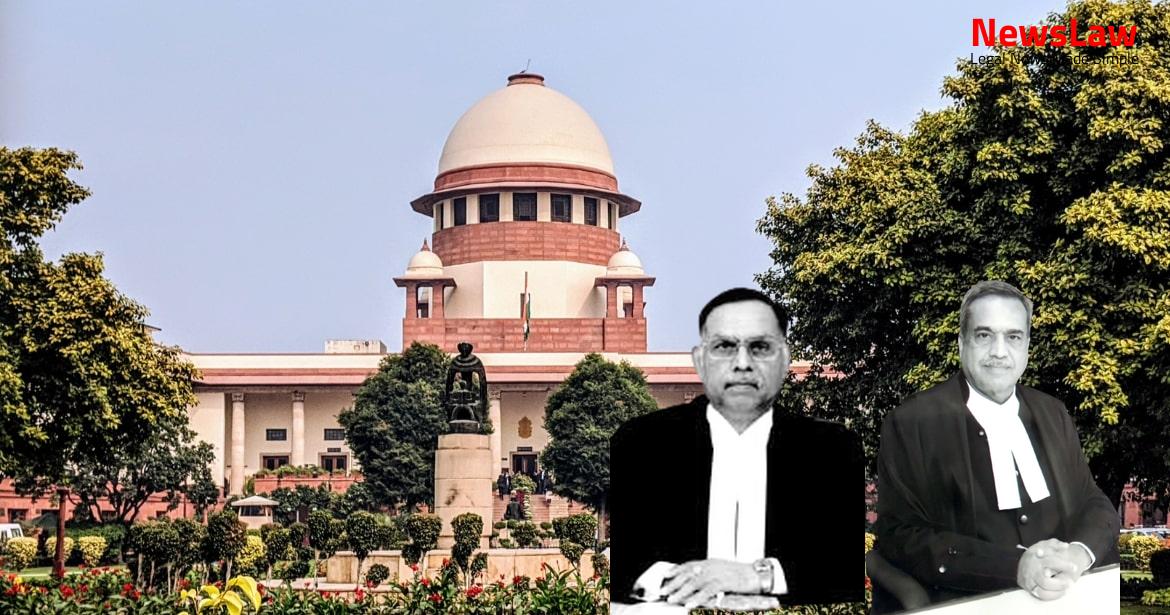In a recent legal case, the court delved into the intricacies of challenging eligibility criteria in a recruitment process. The focus was on the court’s legal analysis regarding the significance of prescribed qualifications for a post, the employer’s authority in setting criteria, and the impact of deliberate suppression of material facts on candidature. Stay tuned to understand the nuances of recruitment processes and the role of eligibility criteria in ensuring fair selection practices.
Facts
- Appellant Bank appealed the judgment and order allowing the writ petition and directing the Bank to allow the respondent to discharge duties as a Peon.
- Single Judge relied on Allahabad High Court decision, stating higher qualification cannot be the basis for denying appointment to Peon post.
- Division Bench of the High Court dismissed the appeal and confirmed the judgment of the Single Judge.
- Appellant Bank preferred the present appeal feeling aggrieved with the Division Bench’s decision.
- The selection of peons in the bank was based on the percentage of marks obtained in 10th and 12th standard as per a circular from the HRD Division.
- The respondent, despite being a graduate, applied for the peon post but was ineligible as per the prescribed education qualifications.
- The respondent’s candidature was cancelled and he was not allowed to join the bank due to his higher qualification.
- The respondent filed a writ petition seeking permission to join as a peon despite being a graduate, which was found to be a deliberate suppression of facts.
- The respondent’s deliberate suppression of being a graduate was discovered during document scrutiny for the peon post.
Also Read: Transfer of Writ Petitions for Chartered Accountants’ Tax Audit Guidelines
Issue
- The issue before the Court is whether the High Court was justified in directing the appellant Bank to allow the respondent to discharge his duties as a Peon despite suppression of the material fact that he was a graduate.
- The respondent failed to disclose his graduate status in his application/bio-data.
- The appointment order for the respondent was issued on 03.10.2016 but was later cancelled.
- The primary question is whether the respondent should be allowed to continue in the role of a Peon despite the cancellation of the appointment order.
Also Read: Analyzing Interference with Acquittal in Legal Conviction Case
Arguments
- The appellant Bank opposed the petition based on the educational qualification criteria mentioned in the advertisement.
- The criteria specified that the candidate should not be a graduate as of 01.01.2016.
- The respondent, being a graduate as of the specified date, was deemed ineligible for the position of Peon.
- The High Court directed the bank to allow the respondent to perform his duties as a Peon, which the appellant Bank vehemently opposes.
- The appellant argued that higher qualification should not override the specified eligibility criteria.
- The appellant highlighted Circulars issued by the HRD Division of the Bank regarding the selection criteria based on marks obtained in 10th and 12th standard.
- The appellant emphasized that the respondent did not challenge the eligibility criteria originally and should not be allowed to claim eligibility based on higher qualifications.
- The Circulars issued by the Bank specifically mentioned that a graduate would not be eligible for the Peon position.
- The appellant contended that the respondent willfully suppressed the fact of being a graduate and therefore was rightfully disqualified.
- The High Court’s decision to allow the respondent to perform duties as a Peon was strongly contested by the appellant.
- Legal precedents were cited to support the argument that eligibility criteria set by the employer should be upheld unless found arbitrary.
- The appellant maintained that the respondent’s appointment order was rightfully cancelled upon discovering the discrepancy in qualifications.
- The High Court’s directive for the bank to allow the respondent to resume duties as a Peon was deemed erroneous by the appellant.
- The eligibility criteria/educational qualification mentioned in the advertisement was 12 standard, not a maximum qualification.
- The cancellation of the appointment was solely based on the respondent’s higher qualification than 12 standard.
- The High Court’s decision to allow the respondent to discharge duties as a Peon was justified.
- The High Court did not commit any error in directing the appellant Bank to reinstate the respondent.
Also Read: Judicial Review on Sentence and Compensation in Criminal Case
Analysis
- The appellant Bank advertised for the post of Peon with specific eligibility criteria.
- The Bank discontinued the interview process and opted for selection based on marks in 10th and 12th standard.
- The respondent, who was over-qualified as a graduate, applied for the Peon position by suppressing his actual qualifications.
- The High Court directed the Bank to allow the respondent to work as a Peon despite the suppression of his graduate status.
- The Bank rightfully cancelled the respondent’s candidature upon discovering the suppression of information.
- The Bank’s decision to not allow the respondent to join based on false information was deemed justified.
- The Bank had consciously decided on specific eligibility criteria regarding qualification since 2008, excluding graduates from the Peon position.
- The respondent failed to challenge the eligibility criteria during the recruitment process.
- The respondent’s act of hiding his graduation status was a deliberate suppression of material fact, impacting his candidature.
- The High Court’s order to permit the respondent to work as a Peon was criticized for overlooking the deliberate suppression of material information.
- Recruitment policy allows the State as an employer to prescribe qualifications for a post.
- The qualifications for a post are determined based on the nature of the job, required aptitudes, qualification functionality, and course content.
- Judicial review does not extend to assessing the relevance of prescribed qualifications for posts.
- The case of Jyoti K.K. revolved around a specific rule where a higher qualification could presuppose the acquisition of a lower qualification.
- In the absence of such a specific rule, higher qualifications do not automatically fulfill lower qualification requirements for a post.
- The employer has the authority to assess the needs of public services and set qualifications accordingly.
- Equivalence of qualifications is within the employer’s domain, not subject to judicial review.
- Deviation from recruitment rules can bar eligible candidates and allow entry to ineligible individuals.
Decision
- The impugned order dated 22.11.2019 passed by the Division Bench of the High Court and the judgment and order passed by the learned single Judge of the High Court dated 13.03.2019 directing the appellant Bank to allow the respondent – original writ petitioner to discharge his duties as a Peon as per appointment order dated 03.11.2016 is unsustainable.
- The above order and judgment are quashed and set aside in the appeal.
- The post in question being a subordinate staff post/Peon, the cost is not imposed despite the mischievous act of the original writ petitioner affecting another candidate.
Case Title: CHIEF MANAGER PUNJAB NATIONAL BANK Vs. ANIT KUMAR DAS (2020 INSC 629)
Case Number: C.A. No.-003602-003602 / 2020



